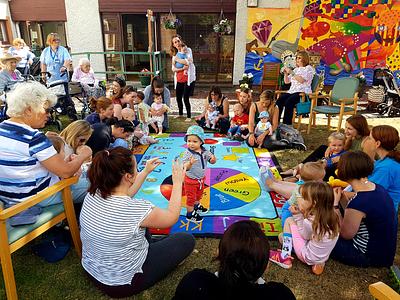Looking for all Articles by Loreen Pardoe?
Bringing generations together through stories, songs and rhymes
Caroline Messer, East Lothian Senior Librarian and Bookbug Co-ordinator, and Loreen Pardoe from Generations Working Together reflect on the joys and challenges of sharing stories, songs and rhymes intergenerationally

Our first intergenerational Bookbug Session in East Lothian took place in St Anne's Care Home in Musselburgh in 2016. A group of regular library families were more than happy to come along with their wee ones – several of them mentioned that without grandparents nearby their children rarely had the chance to interact with older people. It was so emotional to watch everyone join in with the familiar songs and rhymes and watch the little ones interact with their hosts. The activities co-ordinator reported that everyone could talk of nothing else for days.
Taking the plunge
From that very tentative beginning we took the plunge and decided that Bookbug Week in 2018 would focus on intergenerational sessions. We held sessions in care homes, day centres, lunch clubs and at carers groups, good memories cafes and invited residents from a local care home to a library session. These initial sessions created some fantastic relationships and many of them became regular monthly events as well as putting nurseries and older people's settings in touch.
Then Covid happened, so everything stopped.
As a service we switched Bookbug online and supported colleagues in our community hubs as well as taking responsibility for calling shielding individuals. But the links between the generations were cut.
Recognising the disconnect between care homes and their communities as well as the number of restrictions on nurseries and schools to connect with their wider communities, Generations Working Together and East Lothian Libraries linked a village care home and a nearby nursery for an online Bookbug Session as part of Intergenerational Week 2021.

Why share intergenerational stories, songs and rhymes?
Working intergenerationally with story, song and rhyme at the heart of Bookbug Sessions is rich in both experience and in key language development and retention.
One of the pleasures is seeing both young and old connect with the rhythm, fun and familiarity. We concentrate on traditional rhymes and songs introducing new ones slowly over a number of weeks. Text is repetitive and simple, including rhyming words and encouraging actions so brain and body are connected.
The sessions are designed to be engaging and inclusive for young children, which naturally supports older adults even with cognitive or physical deterioration and makes a space for older and younger to connect together meaningfully, as each has an equal role in the session, bringing personality and relationships to the fore.
Postive outcomes
The older participants in the care home very naturally engaged with the children virtually, joining in both fine motor (including the use of small muscles found in the hands) and gross motor (including the use of larger muscles in the arms, legs and torso) actions and rhymes, led by the librarian. It was evident that they were loving the experience and participating whole-heartedly. This helped the care home residents connect through sharing this experience together.
Initial feedback, and that which came later via the care home manager, was that they had been full of chat about the session, shared what they did with other residents, continued to repeat the rhymes with the actions and reminisced about other childhood stories, songs and rhymes from their own childhoods and even those they had shared with their children. They had loved seeing the children's faces on screen with them.
The experience was enjoyable though not as rewarding for the young children in this session as they all had to be close to a laptop. This made it slightly harder for them to collectively engage through the small screen, yet also participate in the session. Despite this, the response was positive overall and the children were able to interact with the session, enjoying the librarian's skilled delivery and the actions and visible responses from the older people joining them. For future online sessions, we would look to explore ways to give both groups access to a larger screen – but we are very hopeful that in the not too distant future we can get back to our much loved and missed in-person intergenerational sessions.
